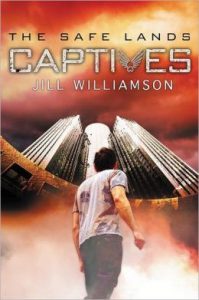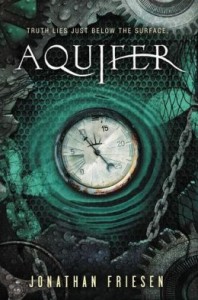Two weeks ago Hayley, Joseph, and Abby discussed two inaugural titles from Blink, Zondervan’s new YA title. Today they’re back with two more. Both these novels could be classified as “Dystopian” fiction but they vary widely in setting and style. Let’s get the conversation going:
Hayley, could you give us a three-sentence summary of Captives, by Jill Williamson? (No spoilers!)
Hayley: In a dystopian American west, people live clustered close to the remaining clean water sources. The Safe Lands  city boasts many conveniences, but a mysterious disease is wasting the population, causing the Safe Landers’ attention to turn toward the small communities living outside the city walls. A raid is made, captives are taken, and conflict and adventure ensues.
city boasts many conveniences, but a mysterious disease is wasting the population, causing the Safe Landers’ attention to turn toward the small communities living outside the city walls. A raid is made, captives are taken, and conflict and adventure ensues.
Abby, what aspects of this novel especially struck you?
Abby: In this book, action never really stops building. Danger lies around every corner for the characters, but Jill Williamson really shines in her character building. From the beginning, a clear tension is built between the main characters, brothers Mason, Levi, and Omar. The moment Safe Landers capture the village of Glenrock, something snaps in all three of them, launching them on their journey throughout the rest of the book. Mason immediately comes into his own, taking on responsibility and working to save people. Levi is sobered by the horrible event, and spends the rest of the book transforming from a rash teenager to a responsible adult. Omar, the brother who sold his village to the SafeLanders, quickly spirals into depression and wild living, throwing away his life. Despite their differences, these three brothers remained linked by their family ties, and I look forward to reading more about how they interact in Williamson’s next book.
Okay, whenever anybody mentions dystopias these days, comparisons are inevitable with the “alpha narrative,” The Hunger Games. How is Captives similar, and how is it different? Also, what distinctive Christian elements did you notice? Let’s start with Abby this time:
Abby: There are some striking similarities between the two stories. Both focus on characters from small, “backward” towns, separated from the world at large. Both deal heavily with romance. Most surprisingly, however, both also share a central city full of people devoted to pleasuring in their high tech existence, ignorant of the rest of the world. The key difference, though, comes from the perspectives of the authors. While Suzanne Collins wrote The Hunger Games from a secular viewpoint, Jill Williamson draws many of her characters and themes from the biblical book of Daniel. Captive’s characters pay homage to the God of the Bible and constantly call on Him in times of need. Beyond this, Williamson uses her characters and their situations to showcase the tragedy and desolation of sin.
Hayley: Like Abby said, there some definite similarities. Both books take place in a dystopian America and both have a city with an authoritarian government that represents both the best -in technology- and the worst -in sin-. But the two books follow greatly different paths. Captives‘ characters grow and are multi-dimensional, much deeper than their Hunger Games‘ counterparts. Unlike the Hunger Games books, faith and belief systems still remain in the world of Captives. Many of Captives’ characters quote scriptures and hold fast to Christian principles and beliefs. While not as sensual as the Hunger Games, there is definitely romance in Captives and also some sexual themes that show it is written for a young adult, and not middle-grade, audience.
Abby: I love that Williamson is not afraid to take up some more mature themes. Captives, unlike The Hunger Games, is really able to use romance in a wholesome way, showing both the benefit of healthy relationships and the tragedies that surround unhealthy ones. While definitely unsuitable for young readers, these themes are especially relevant to teenagers of high school age who are beginning to face a world that feeds them lies about love and romance.
Hayley: Absolutely! In one of my favorite exchanges in the book, Ciddah, a young doctor in the Safelands, has invited Mason to spend the night, ostensibly to sleep on the couch. Mason is tempted, he has strong feelings for Ciddah, but here is his response: “Believe it or not, Ciddah, my leaving right now is proof that I care for you a great deal.” Like Ciddah, some readers may not understand Mason’s reasoning, but it is so refreshing to see strong characters with equally strong moral conviction.
 Thanks for your insights, ladies! The next title we want to talk about is Aquifer, by Jonathan Friesen, a popular Zondervan author. I think Aquifer is his first YA title. Joseph, I know you read this just recently, so could you summarize the plot for us?
Thanks for your insights, ladies! The next title we want to talk about is Aquifer, by Jonathan Friesen, a popular Zondervan author. I think Aquifer is his first YA title. Joseph, I know you read this just recently, so could you summarize the plot for us?
Joseph: Sure! This book is set in the future, the year 2250. The main character, Luca, lives in a controlled society, where everything from the water supply to a person’s emotions are regulated. This society is run by a supposedly benevolent Council of Nine. Those who challenge the council’s authority, however, are quickly removed by their henchmen, the cruel Amongus. Already struggling with this way of life, Luca is thrown into even more difficulty when his father disappears. What’s more, Luca is destined to become the Deliverer, the one who provides water for the whole community. I’ll stop there. For the rest of the plot you’ll have to read the book.
Hayley, what do you think distinguishes this story from other dystopian tales, like Divergent?
Hayley: For one thing, the location! Instead of Divergent’s Chicago, Aquifer takes place in Australia. Also, while Tris Prior’s character develops within her society, Luca, the main character in Aquifer, grows and matures outside of a certain group or society. Unlike many other dystopian stories, Aquifer offers hope and, for many characters, the promise of redemption from past sin. While not profound, it has much more spirituality than other dystopian books I have read.
Joseph, you told us in our last post that you hadn’t read much “Christian” youth fiction. In what ways did Aquifer surprise you (pleasantly or not)?
Joseph: I think Jonathan Friesen does a good job including Christian principles in his work without being overly religious. Since the goal of this series is to reach a non-Christian audience, I think that’s really important. He gets his readers into the storyline, which is compelling, and then subtly includes good morals and admirable characters. So I was impressed with that facet of this work. I also just really liked the way the story draws the readers in. Friesen makes the story interesting and enjoyable for all, young adults and others.
Hayley, what do you consider to be the peculiar (unique, not strange) strengths of this story? Harking back to Blink’s stated mission of appealing to non-Christians as much as believers, how well do you think it succeeded?
Hayley: The strength of Aquifer, and something I loved, is the way in which God is woven into the story. As the story progresses, Luca begins to hear a voice in his head which gives him guidance and direction. As a Christian, it is easy to recognize a reference to God’s guidance through the Holy Spirit. For non-Christians, Luca’s response is equally easy to understand: he thinks he must be going crazy. Luca’s journey is not only a physical one, it is also quite spiritual. I think Aquifer will succeed in drawing in non-Christian readers who are hungry for any new dystopia. The story is satisfying and the ending unexpected. It leaves questions and implications worthy of discussion, and it provides fodder for any thoughtful reader.
Joseph: I agree. I loved the way the author developed Christian elements into the story. Much of the time, the attempt to include a moral message in some books seems forced or unnatural. So I was really impressed with this particular work. I don’t think non-Christian readers would be put off at all by the spiritual elements of the story, because they are such an integral part of it. But on the other hand, Christian readers can easily see the spiritual themes in the work and enjoy them as such, without feeling like they are reading a sermon. So both sides will really appreciate this book I think.
Hayley: This is a book that will be enjoyed by many readers, both Christians and non-Christians. With these two dystopian novels, Blink has certainly succeeded in their mission, and I look forward to reading more books from Blink in the future!
Those are some very enthusiastic recommendations–and totally unsolicited. Good to know Blink is off to such a promising start, and may their mission never be diluted.
For more science fiction recommendations for all ages, go here and here and here. And be sure to check out our numerous posts on nonfiction science books on the home page!
Support our writers and help keep Redeemed Reader ad-free by joining the Redeemed Reader Fellowship.
Stay Up to Date!
Get the information you need to make wise choices about books for your children and teens.
Our weekly newsletter includes our latest reviews, related links from around the web, a featured book list, book trivia, and more. We never sell your information. You may unsubscribe at any time.
We'd love to hear from you!
Our comments are now limited to our members (both Silver and Golden Key). Members, you just need to log in with your normal log-in credentials!
Not a member yet? You can join the Silver Key ($2.99/month) for a free 2-week trial. Cancel at any time. Find out more about membership here.
1 Comments
Leave a Comment
You must be logged in to post a comment.


[…] Captives by Jill Williamson. Reviewed at Redeemed Reader. […]